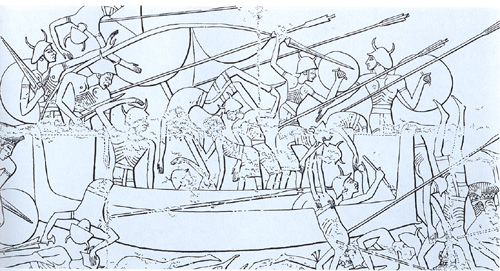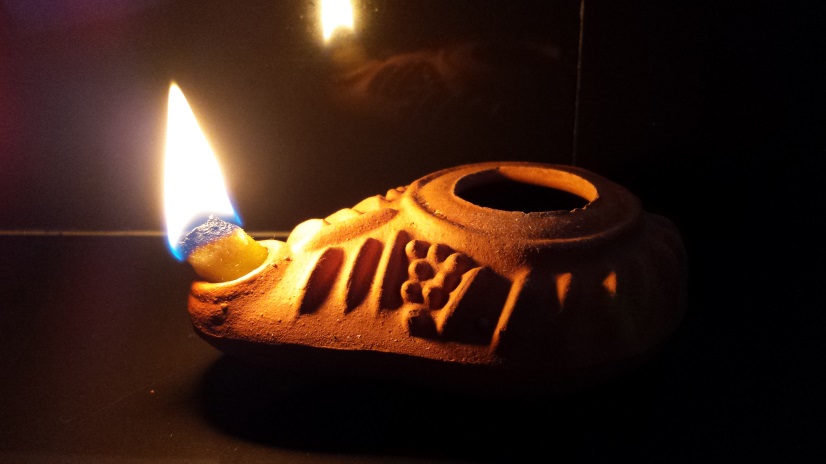This post was prompted by a recent Facebook link concerning battle reenactment societies and the long sword. Quite an exciting thing in its own right, but my thoughts inevitably strayed earlier in time. The long sword is often linked with Viking or medieval times, but there is good evidence that its introduction was a major contributory cause to the collapse of Bronze Age culture in the middle east.
This cultural collapse has had several proposed causes over the years, including mass tribal migration, climate change and natural disasters. The main provocative question is why such factors caused collapse of a social hierarchy this time, when similar issues had been faced and survived before.

Around 1200BC, all around the eastern Mediterranean, well established cultures fell and cities were sacked. The incoming wave of new people was – just – halted at the borders of Egypt. When society recovered, the former chariot-based elite groups had fallen from power. Chariots ceased to be the dominant battlefield weapon, and became a mere transport vehicle used to convey heroes to the front line or ride in triumph afterwards.
Militarily, two weapons emerged as the new superior choice. One was the javelin, and the other the long sword. The new swords were considerably longer than the previous patterns, and were weighted so as to slash rather than thrust. Together, skirmishing bands and armies were able to defeat the bow-armed chariot riders who had ruled before, and in the process overturned the social order which had elevated charioteers into the nobility. From the Mediterranean shores across to North India, the day of the elite charioteer was over. It was a social change as profound as the slaughter of mounted Medieval knights by peasants armed with the longbow.
Turning to fiction, The Flame Before Us explores this social revolution from both sides. Here’s a brief extract. Yasib, son of a noble family from the fallen city of Ikaret (modern Ugarit) is talking with Nikleos, an older man whose clan is part of the wave of newcomers. Their cross-cultural friendship is in its early stages.

“In Ikaret, do you train your boys like this?”
“Not really with throwing weapons. Some learn the bow. Some learn to direct the chariot horses, and the best ones train to shoot arrows while riding at speed. Boys from the common families learn to use a spear or the stabbing sword. When the city fell it was at night. They say that traitors opened the gates and set fires near the docks. If we had been able to meet the attackers with chariots the city would stand yet. But they were away from the city, serving the great King of the North along his borderlands.”
Nikleos pulled a face. “That day has gone. I have seen battlefields littered with broken chariots and dead horses, where living men armed with javelins and the long sword mastered them. Against that, a chariot is no better than an ox cart, and is fit only to carry men to the place where they will fight hand to hand.”
Yasib thought for a while, then turned away from the up and down curves of the missiles.
“I was in training to be a runner; a man who keeps close to the chariots in order to protect the fallen on our side and harass those of the enemy. I do not really have the speed for it, but my father wanted me to learn the runner’s discipline before ever I took up the reins. Still less be the bowman on board. But perhaps now I will never be a rider.”
“Why would you want to be?”
Yasib looked at him. “Why not? The rider has a place of honour among men of rank.”
“Look at these boys, Yasib. They are learning the javelin. When they are older they will learn the longsword, but already these boys could defeat a chariot.”
Yasib shook his head in disbelief. “They have no skill with the bow.”
“They do not need it. There are ten boys here. Think of them spread out so that your bowshots would not easily strike them. They throw ten javelins, and even at their age one or two might hit a horse at the walk. Another few years, and most will hit a horse at the trot or the canter.”
“You fight against horses?” He sounded shocked. “What harm have the horses ever done to you?”
Nikleos shrugged. “We fight to win battles. No horse: no chariot. No chariot: no kingdom. Better for you that you never become a rider, perhaps.”
Look out for The Flame Before Us early next year!
